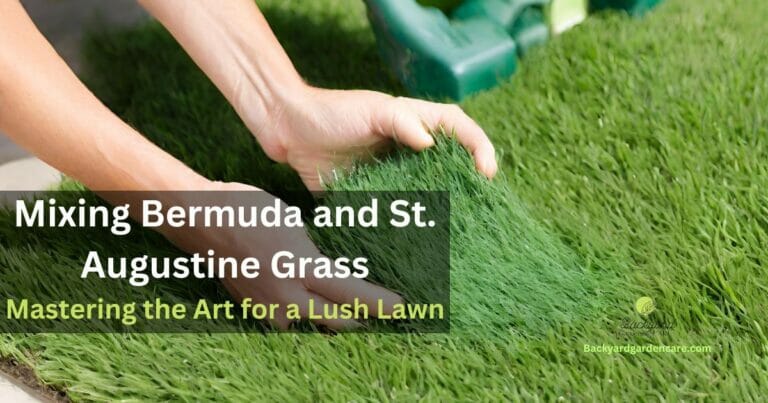The Pros And Cons Of Black Mulch: A Comprehensive Guide To Know.
When it comes to landscaping, there are many options available for achieving the look you desire. One popular choice is mulch, which adds aesthetic appeal and has practical benefits for your plants and soil.
Choosing the right mulch for your plants is crucial for their growth and overall health. The best mulch option is black mulch, which adds aesthetic appeal and provides numerous benefits to your garden.
It is important to remember that black mulch has advantages and disadvantages, just like any other gardening material. In this article, we will explore the pros and cons of black mulch.
By understanding the advantages and disadvantages of this mulch, you can make an informed decision about whether or not it is the best choice for your landscaping project.
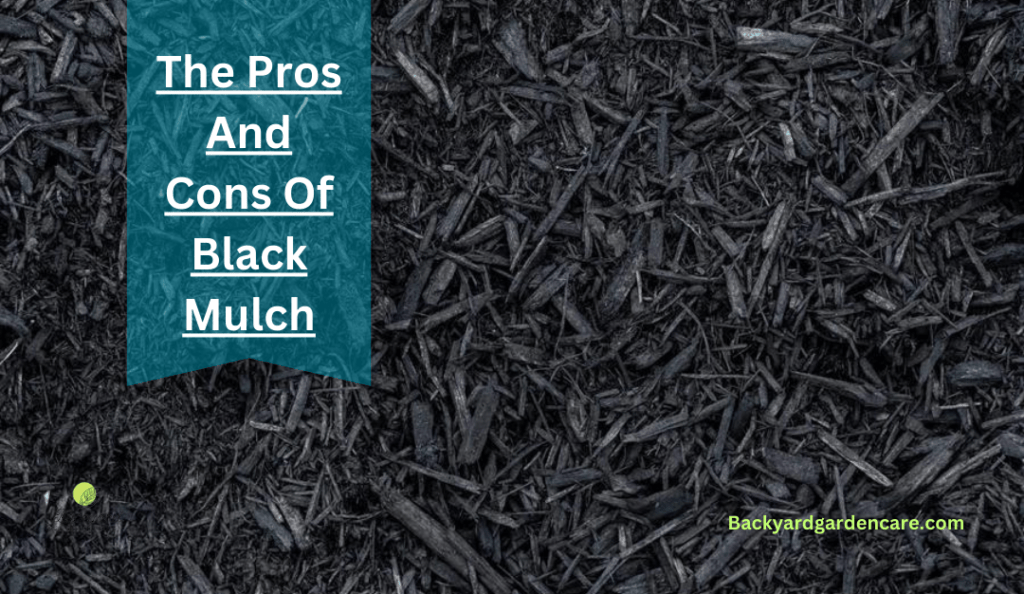
Let’s look at the pros and cons of black mulch.
An Overview of The Pros And Cons Of Black Mulch.
Black mulch is a popular material used in landscaping for various reasons, including preventing weed growth and preserving moisture. Although black mulch typically refers to bark mulch that has been dyed, it can also include other materials, such as rubber mulch and plastic mulch.
Here we explore the different types of black mulch, their production methods, benefits, drawbacks, and environmental considerations.
What is Black Mulch Dyed with? Recycled and Enhanced
Drawing from my knowledge in gardening, black bark mulch is an environmentally conscious choice for both weed control and soil enhancement. This mulch is crafted by repurposing wood from various sources like old furniture, pallets, and construction debris, offering an eco-friendly solution to gardeners.
While it may not have an initially attractive appearance in its natural state, I’ve found that the addition of a carbon-based dye transforms it into an appealing black hue.
This not only enhances its visual appeal but also improves its functionality by helping to regulate soil temperature and retain moisture. It’s important to note that fresh wood chips can’t be dyed, underlining the importance of using recycled wood to produce black bark mulch.
Black Plastic Mulch: Versatile and Long-Lasting.
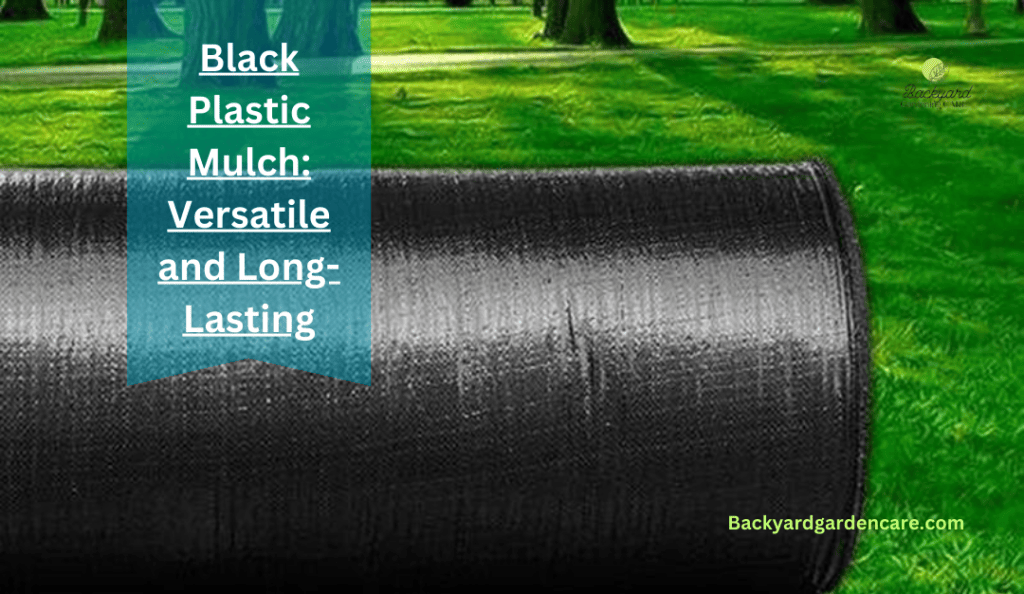
Black plastic mulch, also known as geotextiles or polypropylene mulch, is another variant of black mulch. This black mulch variety has multiple benefits, such as retaining soil moisture and suppressing weed growth.
Its primary weed suppression mechanism is shading and elevating soil temperatures, which can eradicate any pre-existing weeds. Furthermore, black plastic mulch prevents weeds from germinating, thus reducing the need to weed your garden regularly.
It is important to consider the disadvantages of using black plastic mulch. As time passes, soil can gather on top of the mulch, leading to the growth of weeds.
Additionally, black plastic mulch cannot be recycled or decomposed. Nonetheless, there are now biodegradable plastic mulches available from some manufacturers, although they may come at a higher cost, providing a more eco-friendly option.
Rubber Mulch: Considerations and Concerns.
Rubber mulch is a common type of landscaping made from recycled and shredded tires. There is a general perception that it is non-toxic and safe to use in gardens. Still, it contains a wide variety of potentially harmful contaminants that are detrimental to the environment, people, pets, and the environment itself.
Furthermore, rubber mulch is highly flammable and difficult to put out in a fire. Interestingly, despite its popularity, rubber mulch is not as effective at suppressing weeds as other types of mulch.
Pros of Black Natural Mulch
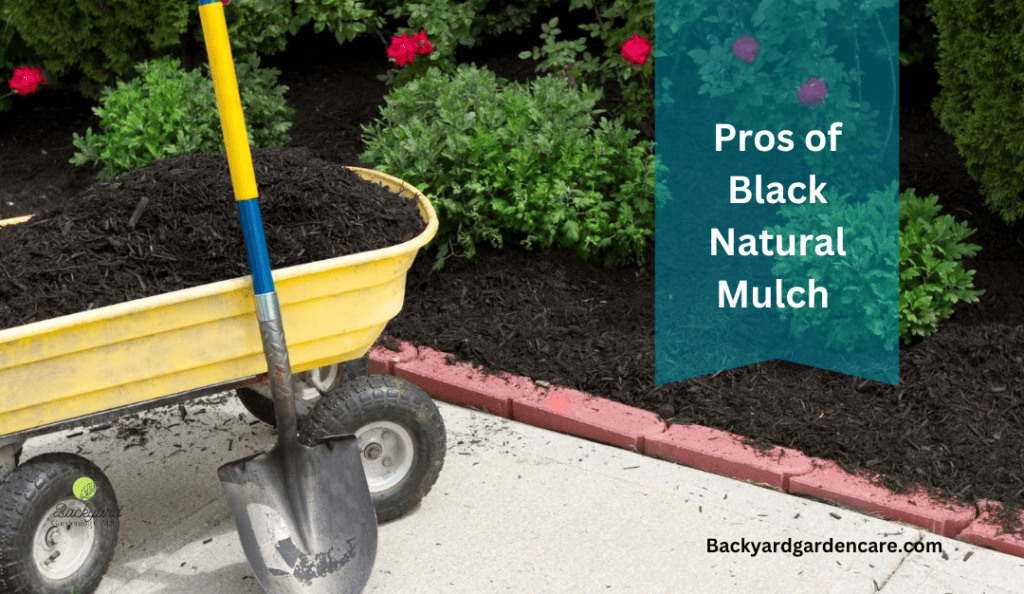
Black bark mulch, commonly used in landscaping, offers several advantages for gardens and yards. Let’s explore some of the pros of using black bark mulch:
Aesthetic Appeal: One of the primary benefits of black bark mulch is its visually appealing appearance. Its rich and dark colour provides a stunning contrast that can accentuate the beauty of any garden or yard.
There is no doubt that mulch provides a stunning background for plants, flowers, and other landscape features, producing a well-groomed and refined look to your garden. Its visually appealing appearance adds an extra touch of elegance to any outdoor space.
Weed Suppression: Black bark mulch is a powerful tool for weed control and suppressing weeds. A dense layer over the soil creates a barrier that blocks sunlight from reaching weed seeds and impairs their ability to sprout.
When this is done, there is less chance of weeds and desirable plants competing for resources like water and nutrients, reducing the need for manual weeding throughout the garden and reducing the amount of time and energy it takes to maintain.
Moisture Retention: Another advantage of black bark mulch is its ability to retain moisture in the soil, especially in a wet yard. It acts as a protective layer, which reduces the rate of evaporation caused by the wind and sunlight, and this helps conserve water.
When you live in a hot, dry climate or during times of drought, this feature can be extremely useful since it can help maintain the proper level of moisture in the soil for healthier plant growth during hot and dry weather.
Soil Temperature Regulation: Black bark mulch also aids in regulating soil temperature and can help protect against extreme temperatures that can kill grass seeds. It acts as an insulating layer during hot summers and cold winters, keeping the soil cooler during the warm months and warmer during the colder months. This temperature moderation creates a more favourable environment for plant root systems, promoting their overall health and strength.
Organic Matter and Nutrient Contribution: As black bark mulch breaks down over time, it adds organic matter to the soil. It is important to realize that as the decomposition process occurs, the soil becomes richer in nutrients, resulting in improved fertility and quality.
Additionally, organic matter encourages beneficial soil microorganisms, fostering a healthier ecosystem for plants to thrive.
Erosion Control: The black bark mulch layer helps prevent soil erosion by reducing the impact of heavy rainfall. It acts as a protective barrier, preventing soil particles from being washed away and maintaining the integrity of the landscape.
There is probably no better way to control water runoff from sloped areas or gardens exposed to water runoff than using this method.
Overall, black bark mulch offers several advantages for gardens and yards. These benefits make black bark mulch a popular choice for homeowners and landscapers looking to improve the aesthetics and health of their outdoor spaces.
Cons of Black Mulch
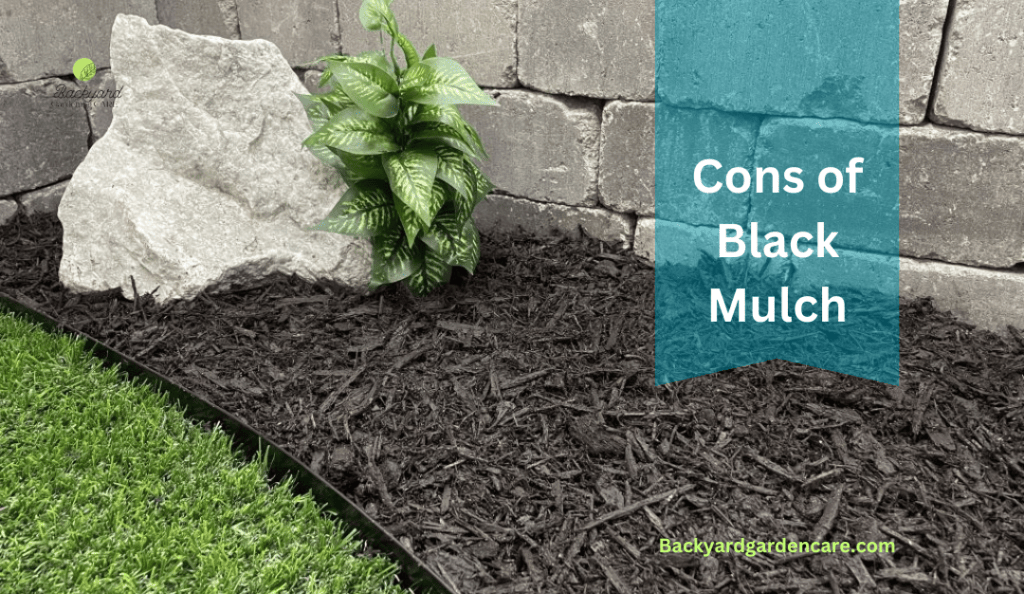
Black mulch is popular for landscaping projects due to its aesthetic appeal and functional benefits. It is essential to consider the possible drawbacks of black mulch before selecting it for your garden or yard.
We will examine the cons of using black mulch, such as colour fading, heat retention, nutrient depletion, weed growth, initial cost and maintenance, and environmental concerns.
Color Fading and Staining: There are several reasons why black mulch may lose its vivid colour over time because of exposure to sunlight and weather conditions, which is one of those reasons.
The once vibrant black hue may turn dull, reducing visual appeal. In addition, the faded mulch may transfer its colour to various surfaces such as walkways, driveways, or clothing, causing staining problems that may be challenging to eliminate.
Pest Attraction: Many people may wonder; does black mulch attract bugs? The answer is yes, as one of the drawbacks of black mulch is its tendency to attract pests. Insects and other kinds of critters can find hiding spots in the dark colour of the roof, which can cause problems if there are no proper pest control chemical measures to prevent this.
Pests such as slugs, snails, and termites may find refuge in the mulch, potentially causing damage to plants or becoming a nuisance. The best way to mitigate these issues is to conduct regular inspections and use appropriate pest management practices.
Heat Absorption: Dark colours, including black mulch, are known for their heat absorption properties. Although this can benefit plants in cooler climates or seasons when temperatures are lower, it can also pose challenges for plants sensitive to heat.
Black mulch absorbs heat excessively, causing elevated soil temperatures, which can cause plants that are sensitive to heat to wilt and suffer from heat stress due to excessive heat absorption. Consider the heat tolerance of your plants and monitor soil temperatures when using black mulch, especially in warmer regions.
Messiness and Tracking Indoors: There is no doubt that black mulch can be messy, especially regarding tracking. Pets or children running through the mulched area can inadvertently carry particles indoors, giving the impression of dirt or soil.
There is a real concern that this may cause for households trying to keep things clean and orderly. Regular sweeping or use of barriers, such as mats or stepping stones, can help minimize the tracking of black mulch indoors and preserve the cleanliness of your home.
Flammability: One significant concern with black mulch is its high flammability. Black mulch retains heat more quickly than lighter-coloured mulches, making it susceptible to fire hazards, especially in areas prone to wildfires.
Due to its heat retention properties, black mulch can cause rapid fire spread due to its high risk of ignition. If you reside in a fire-prone region, it is essential to consider alternative mulching options or take necessary precautions to minimize fire risks associated with black mulch.
Weed Growth on the Surface: The black mulch blocks sunlight, effectively suppressing weed growth, but it isn’t foolproof. If the mulch layer becomes compacted or breaks down, weed seeds may find a foothold and germinate on the surface. Regular maintenance, such as periodic raking or fluffing of the mulch, may be necessary to prevent weed growth and maintain the desired aesthetic.
Conclusion
Black mulch has its advantages and disadvantages. It can enhance the appearance of your garden, retain moisture and suppress weeds. However, it can also increase the temperature of the soil and cause damage to plants if not used properly.
Considering all the factors before choosing black mulch for your garden is important. By understanding the pros and cons of black mulch, you can make an informed decision and ensure a healthy and beautiful garden.
FAQs
Is Black Mulch Safe for Dogs?
Black mulch is generally safe for dogs as it is made of organic materials such as wood chips or bark that have been dyed with non-toxic colorants. However, it is always important to supervise your dog when they are around mulch as they may try to eat it or inhale the dust, which can cause gastrointestinal issues or respiratory problems.
Additionally, some commercially sold mulches may contain added chemicals or pesticides that can be harmful to dogs, so it is important to read the label and choose a safe and natural product.
What Color Mulch Looks Best With Tan House?
Choosing the right color of mulch for a tan house can be a matter of personal preference. However, some options that might complement a tan house include dark brown, black, or red.
Dark brown mulch can provide a natural and earthy look, while black mulch can create a more modern and sophisticated appearance. Red mulch can also add color and contrast with the tan house.
What Are the Disadvantages of Black Mulch?
Black mulch has some disadvantages that should be considered before landscaping or gardening. One of the main drawbacks of black mulch is that it can absorb and retain more heat than other types of mulch, which can cause the soil to dry out faster and potentially harm the plants.
Also, black mulch can attract insects and pests, particularly if improperly installed. Furthermore, black mulch may not be the best choice for certain plants or flowers that require a more acidic soil environment.
Is Black or Brown Mulch Better?
Both black and brown mulch have their advantages and disadvantages. Black mulch is better for gardening purposes as it retains heat and moisture, which helps in plant growth.
Brown mulch, on the other hand, is more environmentally friendly and provides a natural look to your garden. Choosing between black and brown mulch depends on personal preference and specific gardening needs.
What Are the Benefits of Black Mulch?
There are several benefits of using black mulch in gardening and landscaping. It helps retain moisture in the soil, suppresses weed growth, regulates soil temperature, and enhances the garden’s overall appearance. Additionally, black mulch can contribute to soil health by providing organic matter as it breaks down over time.
Is Black Mulch Better?
Black mulch is a popular choice among gardeners and landscapers because it enhances the appearance of garden beds and helps retain moisture in the soil. Furthermore, black mulch can help regulate soil temperature and suppress weed growth.
Albert Phipps

Hello, I’m Albert Phipps, your trusted professional gardener. I have a deep passion for nurturing nature’s beauty, With years of experience in landscaping. I’m dedicated to creating lush, vibrant gardens and outdoor spaces.
If you’re seeking guidance on plant selection, grass care, pest control products, garden design, or lawn maintenance tips, don’t hesitate to get in touch. I’m here to help you transform your outdoor space into a thriving and serene landscape.



